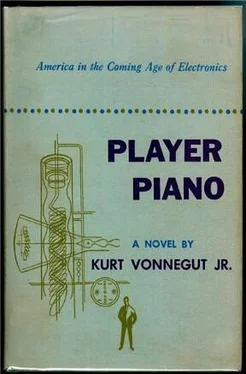Von Neumann looked surprised. "Heavens, they were signed and mailed out hours ago, while you were asleep."
"Thank you."
"You're welcome, Paul," said the professor absently.
"You don't expect that they'll really go along with us on the new controls, do you?" said the nervous man.
"Not for a minute," said Lasher. "But it will certainly get word around about us. When the big day comes, we want everybody to know that ours is a great, big bandwagon."
"Cops!" cried someone from far away in the network of chambers.
Gunfire boomed, echoed and crackled in the distance.
"The west exit!" commanded Lasher.
Papers were snatched from the table, stuffed into envelopes; lanterns were blown out. Paul felt himself swept along through the dark corridors by the fleeing crowd. Doors opened and shut, people stumbled and bumped into pillars and one another, but made no outcry.
Suddenly, Paul realized that the sound of the others' feet had stopped, and that he was following only the echoes of his own. Panting, stumbling in a nightmare of the policemen's echoing shouts and running footfalls, he blundered about the passages and chambers, coming again and again to barriers of dead rock. At last, as he turned away from one of these, he was dazzled by a flashlight beam.
"There's one, Joe. Get him!"
Paul charged past the flashlight, swinging both fists.
Something crashed against the side of his head, and he sprawled on the wet floor.
"Here's one that didn't get away, by God," he heard a voice say.
"Really socked him one, didn't you?"
"Don't pay to mess around with no stinking sabotoors, by God."
"Must be one of the small fry, eh?"
"Sure. Whadja expect? You think this was Proteus walking around in little circles all by hisself, like he don't know which way's up? Nossir, boy. Proteus is in the next county by now, lookin' out for his own sweet tail first, last, and always."
"Sabotagin' bastard."
"Yeah. O.K., you, on your feet and shag your tail."
"What happened?" mumbled Paul.
"Police. You just got brained for savin' Proteus' hide. Why'n't you wise up? He's nuts, guy. Hell, he's got it in his head he's gonna be king."
PAUL'S cellmate in the basement of police Headquarters was a small, elegant young Negro named Harold, who was in jail for petty sabotage. He had smashed a traffic safety education box - a tape-recording and loudspeaker arrangement - that had been fixed to a lamppost outside his bedroom window.
" 'Look out!' it say. 'don't you go crossin' in the middle of the block!' " said Harold, mimicking the tape recording. "Fo' two years, ol' loudmouth and me done lived together. An' evah last time some'un come on pas', they hits 'at 'lectric eye, and ol' loudmouth, he just naturally gotta shoot off his big ba-zoo . 'don' step out 'tween two parked cars,' he say. No matter who 'tis, no matter what tahm 'tis. Loudmouth, he don' care. Jus' gotta be sociable. 'Cayful, now! Don' you do this! Don' you do that!' Ol' mangy dog come bah at three in the mornin', and ol' loudmouth jus' gotta get his two cents wuth in. 'If you drahve,' he tells that ol' mangy dog, 'if you drahve, don' drink!' Then an' ol' drunk comes crawlin' along, and ol' gravelthroat tells him it's a city ohdnance ev'y bicycle jus' gotta have a re -flectah on the back."
"How long you in for?" said Paul.
"Fahve days. Judge said Ah could walk raht out. All Ah had to do was say Ah's sorry. Ah ain' goin' do that, 'cause," said Harold, "Ah ain' sorry."
Paul was glad that Harold was too bound up in his act of integrity to explore Paul's troubles. Not that it would have pained Paul to talk about them, but because they were extraordinarily difficult to describe. His own motivation was obscure, the cast was unwieldy, and, Paul realized, the denouement was still to come. Through all his adventures, he had been a derelict, tossed this way, then that. He had yet to lay a firm hand on the tiller.
The managers and engineers still believed he was their man; the Ghost Shirt Society was just as convinced that he belonged to them, and both had demonstrated that there was no middle ground for him.
When the police had identified Paul, they had been embarrassed by his I.Q., and his rank in the criminal hierarchy: the archcriminal, the would-be king of the saboteurs. There was no comparable rank in the Ilium police force, and the police had, out of humbleness and lifelong indoctrination, sent for inquisitors with adequate classification numbers and I.Q.'s.
Meanwhile, Paul and Harold passed the time of day.
"Ain' a bit sorry," said Harold. "Wha's 'at tap-tap-tappin'?"
The irregular tapping came from the other side of the sheet-metal wall that separated Paul's and Harold's barred cell from the totally enclosed tank for desperados next door.
Experimentally, Paul tapped on his side.
"Twenty-three - eight-fifteen," came the reply. Paul recognized the schoolboy's code: one for A , two for B . . . "Twenty-three - eight-fifteen" was "Who?"
Paul tapped out his name, and added his own query.
"Seven - one - eighteen - twenty - eight."
"Garth!" said Paul aloud, and he tapped out, "Chin up, boy." An exotic emotion welled up within him, and it took him a moment to understand it. For the first time in the whole of his orderly life he was sharing profound misfortune with another human being. Fate was making him feel a warmth for Garth, the colorless, the nervous, the enervated, that he had never felt for Anita, for Finnerty, for his parents, for anyone. "You fixed the tree?"
"You bet," tapped Garth.
"Why?"
"Boy flunked GCT again. He cracked up."
"Lord! Sorry," tapped Paul.
"Dead weight on world. Useless. Drag."
"Not so."
"But only God can make tree," tapped Garth.
"Blessed are fetishists. Inherited earth," tapped Paul.
"Rot, corrosion on our side."
"What next for you?" tapped Paul.
Garth tapped out the story of his being discovered as the criminal at the Meadows, of the furor, the threats, the actual tears shed over the wounded oak. He'd been locked up in the Council House, and guarded by dozens of angry, stalwart young engineers and managers. He'd been promised grimly that he would get the book thrown at him - years of prison, fines that would wipe him out.
When the police had arrived on the island to pick him up, they'd caught the hysteria of the brass and had treated Garth like one of the century's most terrible criminals.
"Only when we got back here and they booked me did they wake up," he tapped.
Paul, himself awed by Garth's crime, was puzzled by this twist. "How so?" he tapped.
"Ha!" tapped Garth. "What's my crime?"
Paul laughed wonderingly. "Treeslaughter?" he tapped.
"Attempted treeslaughter," tapped Garth. "Thing's still alive, though probably never have acorns again."
"Proteus!" called the cellblock loudspeaker. "Visitors. Stay where you are, Harold."
"Ain' going nowhere, 'cause Ah ain' sorry," said Harold. " 'Cayful, look out, now. Walk facin' the traffic.' "
The cell door buzzed and opened, and Paul walked to the green door of the visitors' room. The green door opened, whispered shut behind him, and he found himself face to face with Anita and Kroner.
Both were dressed funereally, as though not to compete for glamour with the corpse. Gravely, wordlessly, Anita handed him a carton containing a milkshake and a sheaf of funnypapers. She lifted her veil and pecked him on his cheek.
"Paul, my boy," rumbled Kroner. "It's been hard, hasn't it? How are you, my boy?"
Paul stepped back out of reach of the big, sapping, paternal hands. "Fine, thanks."
Читать дальше








![Курт Воннегут - Вампитеры, фома и гранфаллоны [litres]](/books/397997/kurt-vonnegut-vampitery-foma-i-granfallony-litre-thumb.webp)